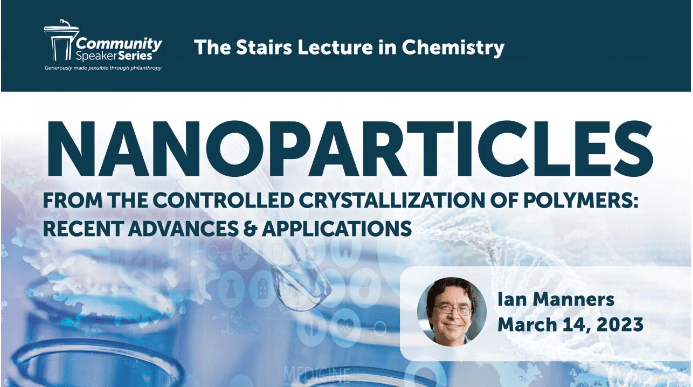The Stairs Lecture in Chemistry, the first endowed lecture series in Chemistry at Trent University, was created by Trent Professor Emeritus Dr. Robert Stairs and his wife, Sibyl. Trent University is excited to present Ian Manner from the University of Victoria to be the next speaker for this biennial lecture series.
Nanoparticles possess widths ca. 1000 times less than that of human hair and have many potential applications in fields as diverse as electronics to cancer therapy. However, their preparation has posed many challenges to chemists. In this lecture, the creation of polymer-based nanoparticles with a wide variety of uses will be described using a new method termed “crystallization-driven self-assembly” (CDSA).
This process involves the use of crystallization to create nanoparticles with different shapes, controlled dimensions, and tailored functions. The CDSA method is attracting growing attention worldwide, and in this lecture, recent work on 1D nanofibers, 2D platelets, and more complex nanoparticles with applications in areas such as light harvesting, catalysis, and biomedicine will be discussed.
Speaker Ian Manners is Canadian and British. He was born in London, England and, after receiving his B.Sc. and Ph.D. in the UK he conducted postdoctoral work in Germany and then in the USA. He joined the University of Toronto, Canada as an Assistant Professor in 1990 and was promoted to Full Professor in 1995 and was made a Canada Research Chair in 2001. In 2006 he returned to the UK to take up a Chair at the University of Bristol in Inorganic, Macromolecular and Materials Chemistry supported by an EU Marie Curie Chair. In 2018 he was awarded a Canada 150 Research Chair at the University of Victoria, Canada on Vancouver Island where he has set up a new research group.
Ian’s research interests broadly focus on synthetic problems at molecular, macromolecular, and longer length scales. His current research projects include: catalytic main group chemistry and main group polymers, functional metallopolymers, crystallization-driven self-assembly of polymers, and nanoelectronics, catalysis, and nanomedicine with soft materials. He is the recipient of a wide range of national and international awards including a Alfred P. Sloan Fellowship (from the US), the Steacie Prize (from Canada), the RSC Award in Main Group Chemistry, and a Humboldt Research Award from Germany. Most recently he received the RSC de Gennes Prize (2017), the Henry Marshall Tory Medal of the Royal Society of Canada (2021), and a 1000 Talents Award from China (2018) to support a Distinguished Visiting Professorship and satellite lab at Shanghai Jiao Tong University.


 Ad Choices
Ad Choices